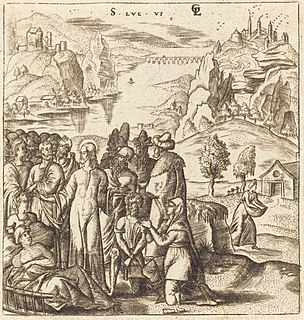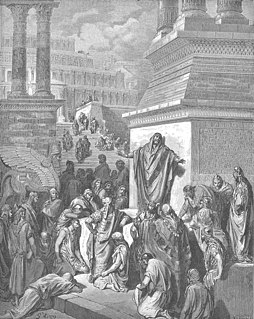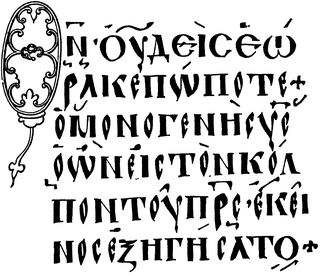Related Research Articles

Matthew 6:18 is the eighteenth verse of the sixth chapter of the Gospel of Matthew in the New Testament and is part of the Sermon on the Mount. This verse concludes the discussion of fasting.

Jesus' teachings referring to little children and infants/babies appear in several places in the New Testament and in the non-canonical Gospel of Thomas.
Matthew 11:11 is the eleventh verse in the eleventh chapter of the Gospel of Matthew in the New Testament.

Matthew 9:2 is the second verse in the ninth chapter of the Gospel of Matthew in the New Testament.

Matthew 9:4 is a verse in the ninth chapter of the Gospel of Matthew in the New Testament.

Matthew 9:6 is the sixth verse in the ninth chapter of the Gospel of Matthew in the New Testament.
Matthew 9:10 is a verse in the ninth chapter of the Gospel of Matthew in the New Testament.
Matthew 11:9 is the ninth verse in the eleventh chapter of the Gospel of Matthew in the New Testament.
Matthew 12:47 is the 47th verse in the twelfth chapter of the Gospel of Matthew in the New Testament.
Matthew 12:48 is the 48th verse in the twelfth chapter of the Gospel of Matthew in the New Testament.

Matthew 9:18 is the 18th verse in the ninth chapter of the Gospel of Matthew in the New Testament.

Matthew 12:2 is the second verse in the twelfth chapter of the Gospel of Matthew in the New Testament.

Matthew 12:41 is the 41st verse in the twelfth chapter of the Gospel of Matthew in the New Testament.

The kiss of Judas, also known as the Betrayal of Christ, is the act with which Judas identified Jesus to the multitude with swords and clubs who had come from the chief priests and elders of the people to arrest him, according to the Synoptic Gospels. The kiss is given by Judas in the Garden of Gethsemane after the Last Supper and leads directly to the arrest of Jesus by the police force of the Sanhedrin.

John 1:20 is the twentieth verse in the first chapter of the Gospel of John in the New Testament of the Christian Bible.
John 1:21 is a verse in the first chapter of the Gospel of John in the New Testament.

John 1:48 is a verse in the first chapter of the Gospel of John in the New Testament.

Matthew 11:2-3 are the second and third verses in the eleventh chapter of the Gospel of Matthew in the New Testament.
Matthew 12:17,18 are two verses in the twelfth chapter of the Gospel of Matthew in the New Testament.
Matthew 12:36-37 are verses in the twelfth chapter of the Gospel of Matthew in the New Testament.
References
- ↑ John MacEvilly, An Exposition of the Gospel of St. John consisting of an analysis of each chapter and of a Commentary critical, exegetical, doctrinal and moral, Dublin Gill & Son 1879.
- ↑ Cornelius Cornelii a Lapide; Thomas Wimberly Mossman The great commentary of Cornelius à Lapide, London: J. Hodges, 1889-1896.
- 1 2 3 4 5 6 "Catena aurea: commentary on the four Gospels, collected out of the works of the Fathers: Volume 6, St. John. Oxford: Parker, 1874. Thomas Aquinas". 1874.
 This article incorporates text from this source, which is in the public domain .
This article incorporates text from this source, which is in the public domain .